
Riddle of Plummeting Dollar, Soaring Prices!
How come despite decrease in price of dollar, the prices of goods and products haven’t plunged? The editorial of Ettelaat daily tries to answer this significant question raised by people.
These days the only important news for Iranian people and even government is soaring prices. The experts say that it is because of distrust towards future of dollar’s price and lack of stability of dollar’s rate that prices of goods and services do not go down. The price of dollar shows 50% reduction, but there isn’t much change in the price of goods and services. Why?
The editorial continues to go over different reasons for such a condition. Most of producers and wholesalers still see fluctuation in the price of dollar and have no assurance towards the future of the dollar’s price. Most of them believe that the price of dollar will increase again, holding that its low price is temporary.
The editorial adds: the prices skyrocket quickly due to any economic disorder but plunge very slowly. Moreover, the other reason for the high prices of goods is the great difference of prices that producers must pay raw materials. The cycle of production and consumption has been very complicated in Iran’s financial and economic market. Even when Iran wasn’t under US sanctions, high prices were always an issue in Iran.
Unpredictability of Iran’s economy is another reason for soaring prices, adds the editorial. To this, one should add weakness of monitoring organizations and lack of sustained control over the prices. People say that the government has no presence in the market.
Ettelaat – December 19
Trifling with People’s Livelihood!
The editorial of Jahan Sanat mulls over the consequences of deterioration in Iran’s economy, focusing on its impact on the workers’ livelihood.
These days we witness shutdown of little and medium businesses, and ensuing unemployment of hundreds of workers. The most important issue in the workers’ community is to provide for workers’ households. If no immediate action is taken to fix this issue, we will witness more problems in the production cycle. No doubt, continuation of recession in production will be a hard blow against people’s livelihood.
The editorial continues: the worker’s wages are calculated annually based on household’s livelihood basket, but the prices are fluctuating daily, given the soaring prices and the inflation in Iran. Right now, the household’s livelihood basket has reached 4,961,000 tomans ($1180), while a worker’s wage, according to experts, is 1,405,000 tomans ($335). There is, as such, 82% decrease in purchase power for each household.
The editorial adds: the impact reveals itself in the society every day — not just in negative economic form, but in the form of social damages. Trifling with production destroys both the employer and the workers. According to the constitution, providing essential needs such as housing, clothes, sanitation, health, education, etc. are all the government’s duties. But because of the statesmen’s negligence, the conditions of workers and employers have become as bad as it gets.
People, the editorial concludes, are suffering from a lot of difficulties, and every day they witness the workforce becoming cheaper, malnutrition, lack of mental and physical health and hundreds of other negative consequences.
Jahan Sanat – December 18
Reformists have to Go with Rouhani’s Government, If…
The editorial of Arman Emrooz focuses on the tie between Iranian reformists and Hassan Rouhani and how they will lose people’s trust if they keep supporting Rouhani and his government.
Current conditions in the country are not comparable with past years or even with 2017. Conditions of political factions, particularly the reformists, show drastic changes and twists. The government, political factions, and domestic conditions have gone through a lot of changes compared with last year. From 2013 to 2017, people were happy with their political choices, particularly given the fact that Rouhani’s government had significant achievements in foreign policies.
The editorial goes on to say: until spring of 2017, everything was moving forward very well. But after Rouhani’s victory in the presidential election for his second term, he was no longer the same. People, reformists, supporters and voters for Rouhani were shocked from his change. People say that it was the reformists who helped Rouhani to become president. After the changes in Rouhani, the reformists were surprised and had to face a president who didn’t pay serious attention to those who voted for him and distanced himself from the political current who supported him.
The editorial adds: under such conditions, the reformists have to pay the price of their support. They must now be after realizing people’s rights so that they can once again earn their trust. If the reformists stand by Rouhani and his government, they will have to go with the government and will lose people’s support and favorable view.
Arman Emrooz – December 17
Prices are Skyrocketing!
Everyday people in Iran wake up while expecting increase in prices of essential and non-essential goods. The editorial of Sedaye Eslahat asserts that Iranian government doesn’t have any plans for controlling the economic conditions in the country.
Why is there so much confusion in prices? How come the government and officials have no supervisions over those who produce or import goods and price them however they want to? How come the price of dollar goes up and when it comes down, the prices do not decrease accordingly? Do employees, workers and low-income groups in the society have the power to buy essential goods like meat, chicken, rice, etc.? It has been months since these people had meat and rice, because they cannot buy them.
The editorial continues: Is the wage or salary of a worker or employee enough to pay for their households’ minimum purchases? The government has no plan for controlling soaring prices of essential goods in Iran. Interestingly, even though there has been 70% drop in the price of dollar from its highest record, the prices of essential goods haven’t had 5% decrease. And in some cases, the prices have even gone up.
On the other hand, the editorial adds, Consumer Support Organization has taken no action to support people and control the prices. Should there be a campaign not to buy goods so that companies and sellers are forced to cut prices? In governments before the revolution, we saw strong confrontation with those who caused prices to go up and hoard essential goods. As such, people’s rights were protected. But today we don’t know what the role of the government is or who is in charge of confronting high prices.
At the end, the editorialist says if the government doesn’t take any measures for controlling the prices, his party – Popular Reformation Party – will soon launch a campaign to support people.
Sedaye Eslahat – December 17
Poverty Line and Inherent Duty of Government
Parliament’s Research Center announced that the poverty line in Iran has increased to 2,850,000 tomans per month for a family of four. The editorial of Ettelaat considers this as a serious warning about livelihood conditions of a major part of the middle and lower classes in Iran.
Drop in the income of small businesses is quite evident in recent months. More extensively, there has been a severe drop in the power purchase of salaried groups in the society, including government employees and the workers in the private sectors, which has significantly damaged households’ livelihood and social and cultural well-being.
The editorial adds: drop in demand for purchasing many goods is proof that purchase power of many groups in the society has gone down. Unfortunately, the first thing eliminated from citizens’ basket of goods is in the field of culture. Reduction in copies of books and publications confirms this hypothesis.
The country’s inflation curve has ascended and even had leaps since May. But it seems that the government and executive and legislative branches are very slow in this regard. It is almost January, and they are still discussing whether to give a raise to employees and workers in new Iranian year (starting from March 21).
The editorial goes on to say: it is a general principle that when the price of food items goes up, it is feared that a part of the society will become poorer as food is the first livelihood requirement of households. The parliament’s report urges that since the poor spend most of their costs on foods, it is predicted that the number of people under the poverty line will continue to grow.
The editorial concludes that the government, according to its inherent duty, is bound to protect people from any dangers including the poverty line. We mustn’t forget that what was announced as poverty line in the summer this year was 2.5 times more than the minimum wage of workers ratified for this year.
Etelaat – December 16
People will not Buy it!
The editorial of Iran daily focuses on former president Mahmoud Ahmadinejad inviting Hassan Rouhani to a debate.
Ahmadinejad’s invitation to debate comes at a time when we are getting closer to the parliamentarian election in which certain figures from his 9th and 10th governments intend to run. Iranian people have seen Ahmadinejad’s debates in 2009 presidential elections. Those debates were followed by many criticisms and protests which created many problems for the country and its fallouts could be seen in many fields for a long time.
The editorial continues: perhaps one can say many problems in Iran started from those debates whose bitter results took over the whole country. Now that Iran is facing different domestic and foreign issues and people are under mental pressures, the country needs a national dialogue so that different political factions and groups can make a joint effort to resolve people’s issues. It won’t help to agitate the country’s atmosphere by holding such pseudo debates.
The editorial concludes: If there is going to be any debates, Ahmadinejad must be invited to be held accountable for his behaviors during two terms of presidency. He must know he has no place in Iran’s political sphere to sit in front of the presiding president. Such behaviors are due a kind of projection in which he questions others instead of being accountable for what he himself has done.
Iran – December 16
![]()
Why is Khamenei Worried about Next Year?
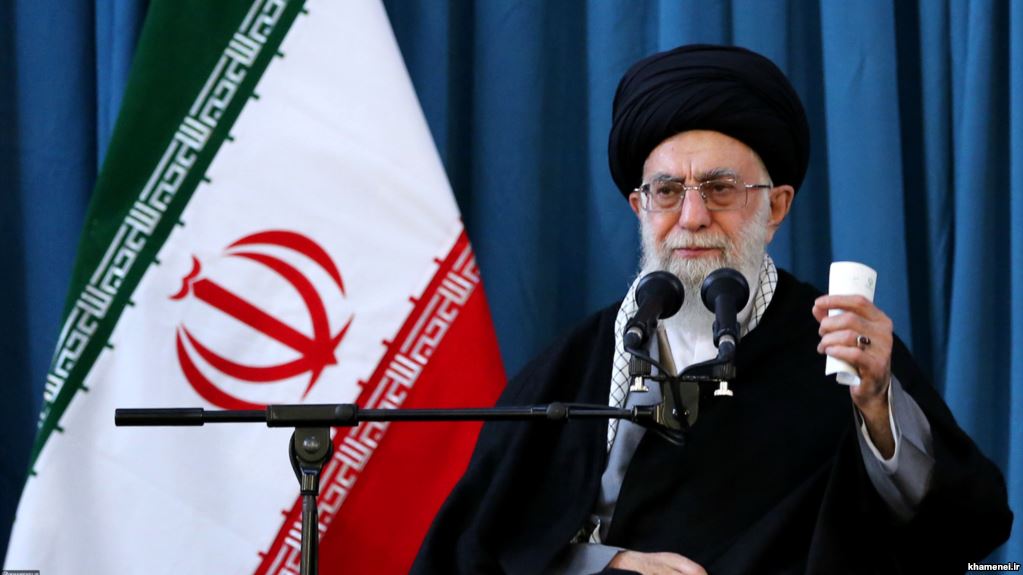
Ali Khamenei recently expressed his concerns about the U.S. conspiracy in the upcoming year and future of his establishment. In a speech addressing families of martyrs of Iran-Iraq war and military operations in Syria, Khamenei said the U.S. administration’s plot against Iran has been uncovered. He added U.S. planned to create discord by sanctions and anti-security measures in the country and persuaded people to take to streets, calling it the “hot summer” project.
“Although the enemy’s plot has been compromised, everyone should be on guard,” said Khamenei. He continued that U.S. might be after “deceiving us” by creating chaos in 2018, while actually having a plot for Iran in 2019.
Khamenei tried to associate different union protests in Iran to the U.S. political project which he called “hot summer”. As always, he used his anti-American views and conspiracy theories in this regard—none of which is valid. Trump, US Secretary of State and Defense Minister have announced that they wanted the Islamic Republic to change its behavior. Despite the fact that the new U.S. administration welcomes regime change in Iran, there is not enough evidence about a US plan for overthrowing the Islamic Republic.
For the past 40 years, Iranian security organizations have not recognized people’s protest, saying they were originated abroad. This time the Islamic Republic is using the so-called “hot summer” project to suppress and delegitimize public protests while it is also worried about the US new sanctions and their impact. Therefore, Khamenei’s warning about “the U.S. administration’s conspiracies in 2019” is actually a reflection of his own concerns about the future of the Islamic Republic establishment.
It seems that the Iranian establishment is planning to find a way to survive until the end of Trump’s presidency. As long as he is in power, any negotiation or agreement with U.S. will be costly for Iran. Thus, the year 2019 has a key significance as the Iranian society should be convinced to tolerate hardships resulted from the government’s inefficiencies as well as US sanctions.
In his speech, Khamenei addressed both people and political factions in the establishment, warning them against any discord or rifts. However, his expectations can be only fulfilled if a major part of people as well as political factions decide to close their eyes to hardships and accept Khamenei’s refusal to negotiate with U.S.
But given the worsening economic conditions, people can no longer tolerate problems—which is an obstacle in the way of Khamenei’s expectations. The Islamic Republic is currently facing the worst crisis of its times as the increasing union protests in Iran can turn into a huge, uncontrollable political movement.
Radio Farda—December 15
Reza Pahlavi: We Cannot Talk of Helping Iranian People, but not Talk of Regime Change
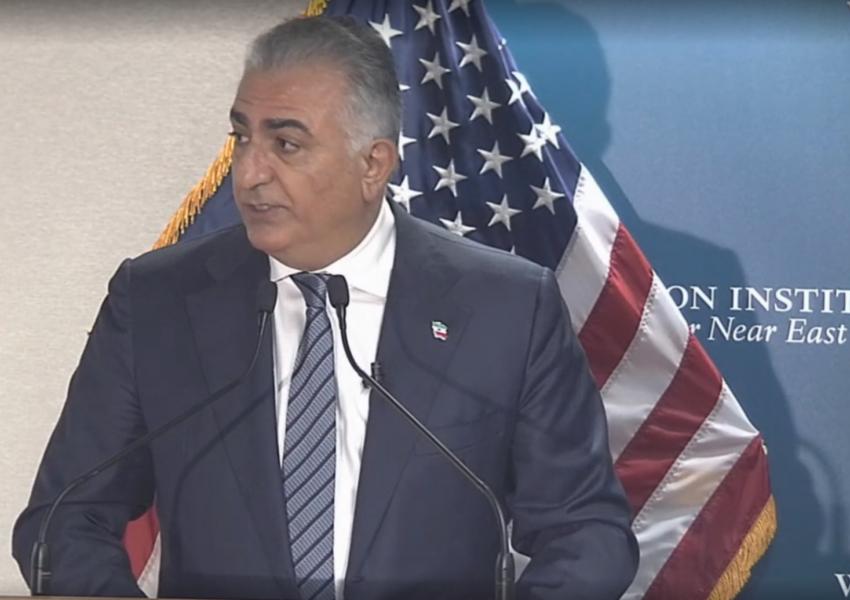
Son of late Shah of Iran, Reza Pahlavi, made a speech in a forum called ‘Forty Years of the Islamic Republic: What next?’ in Washington Institute. In his speech, Reza Pahlavi urged that ‘during past 40 years, Islamic Republic has never been so abominable and vulnerable as it is now’. He called Islamic Republic ‘incorrigible’, saying that regime change in Iran is only possible through Iranian people and through non-violence.
Reza Pahlavi also emphasized that ‘one cannot say we want to help Iranian people, but we don’t want regime change. You want us to reach democracy when this regime is in power. This is contradictory.’
Pointing out to recent protests in Iran, Reza Pahlavi asserted that ‘Islamic Republic has taken our land and people as hostage, and has remained in power through terror, crackdown and violence so far. Tired of these conditions, Iranians have taken to streets to express their disagreement through workers’ strike and civil disobedience.’ Addressing the international community, he called protests in Iran a ‘decisive opportunity’ for finding an enduring solution to Islamic Republic’s threats, as well as an opportunity for changing the Middle East.
Iran International – December 17
UN General Assembly Adopts Resolution Condemning Human Rights Violation in Iran
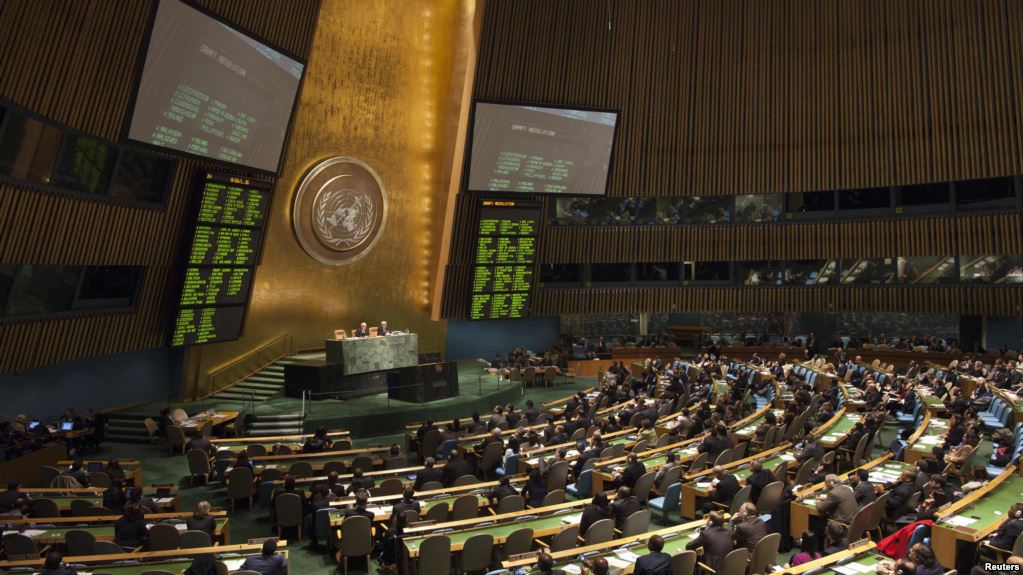
UN General Assembly has adopted a resolution against violation of human rights in Iran. The resolution –ratified with 84 in favor to 30 against, with 67 abstention — condemns Iran’s human rights violations expressing grave concern over the high number of executions, arbitrary and systematic arrests, and atrocious precious conditions.
In addition to western countries, Saudi Arabia, UAE, Yemen and Bahrain voted for the resolution. Russia, China, Oman, Pakistan, Iraq, India, Afghanistan, Lebanon and Venezuela were among those who voted against the resolution. Countries like Qatar, Kuwait, Egypt, Morocco, and Algeria cast votes of abstention.
The resolution stresses that Islamic Republic has intensified measures against protesters, journalists, and social media activists. It also expresses concerns over continuation of execution of adolescents who have committed crimes when under the age of 18.
Pointing to reports as to torturing prisoners, arbitrary arrests, trials without judiciary process, threatening human rights activists, and limiting freedom of speech, the resolution asserts that Iranian regime doesn’t observe the international standards.
Radio Farda – December 18
Prominent Jailed Activist in Critical Conditions Denied Medical Treatment,
Europeans must not Remain Silent against Islamic Republic’s Injustice
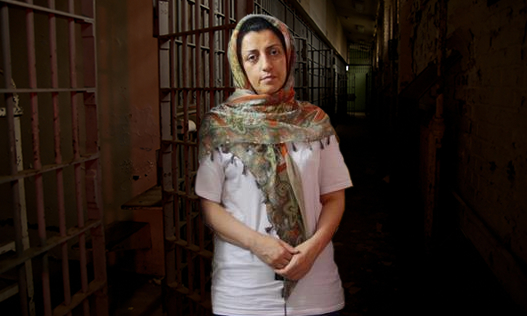
Narges Mohammadi, human rights activist and the vice president of the Defenders of Human Rights Center, has written a letter to Tehran prosecutor, saying she has been denied medical treatment despite her repeated demands. She is suffering from pulmonary embolism and seizure. Her husband had lately said if Mohammadi’s treatment stops, she might become disabled.
Narges Mohammadi was sentenced to 16 years in prison in 2016 for her activities in the campaign of “ending executions in Iran step by step” as well as her peaceful human rights activities, such as interviews with media about rights violations in Iran and taking part in peaceful assemblies.
In another humanitarian case, Nazanin Zaghari Ratcliffe has legally requested parole from Tehran’s prosecutor office, after spending more than half of her 5-year sentence in prison. According to her lawyer Mahmoud Behzadi, now that she has spent half of her sentence, she can request for parole. According to Behzadi, Nazanin Zaghari is ill and waiting for the prison’s approval to be taken to a hospital for treatment.
Nazanin Zagheri had travelled to Iran with her daughter for a family visit when she was arrested by IRGC forces at the airport in 2016. She was sentenced to five years of imprisonment on the charge of participation in ‘soft overthrow’. IRGC accused her of crimes against national security and training journalists. Zaghari dismissed such charges.
Western analysts say that Islamic Republic takes dual nationals like Nazanin Zaghari as hostages to blackmail western countries.
In the meantime, Arash Sadeghi, political prisoner in Iran, wrote an open letter on the occasion of International Human Rights Day, pointing out to widespread violations of human rights during 40 years of Islamic Republic. He urged that European countries mustn’t remain silent against Islamic Republic due to their economic interests.
In his open letter published from within the prison, Sadeghi calls capital punishment, physical elimination of opponents in and out of the country, crackdown on protesting citizens, journalists and political activists as measures of Islamic Republic violating human rights in Iran.
This student activist and political prisoner was sentenced to 15 years of imprisonment on the charge of holding assembly and collusion against national security, insulting the supreme leader, forming illegal groups, and propaganda against Iranian establishment. Currently he is doing time in Rajaee Shahr prison.
Radio Zamaneh—December 15
VOA Persian – December 16
VOA Persian – December 18
Iran Security Forces Violently Raid Ahvazi Workers’ Homes at Night; US Condemns

More than 41 workers of Iran National Steel Industrial Group in Ahvaz have been arrested so far, reported Union of Free Workers of Iran. Security forces violently attacked workers’ homes at midnight, taking dozens of them into custody. Detained workers have been taken to Ahvaz’s central prison, and the reason for their arrest is not clear yet.
With the continuation of such arrests, a number of workers spend nights on streets of Ahvaz in order to avoid being detained.
Workers of Iran National Steel Industrial Group were supposed to negotiate with senior authorities of Khuzestan province. However, they have decided not to enter into any negotiation until all detained workers are released.
Some of the workers also threatened that if their demands were not met, they would continue their protests in Tehran.
Workers of Iran National Steel Industrial Group have repeatedly gathered in front of different state organizations in Khuzestan Province to follow up on their demands, which include ‘paying unpaid wages’, ‘resuming production and providing raw material’ and ‘paying attention to workers’ livelihood’.
The United States strongly criticized Islamic Republic for arresting workers, announcing support for them. Robert Palladino, deputy spokesperson in US State Department, wrote in his twitter, ‘Iran’s regime arrested steelworkers who simply asked to get paid for their work. Sadly, this is how the regime has always mistreated the Iranian people. The U.S. supports their rightful demands. Iranians deserve to live in peace and dignity.’
Peike Iran
Nepotism in Iran: Rouhani’s Son-in-Law Appointed as Deputy Minister, Resigns after 3 Days
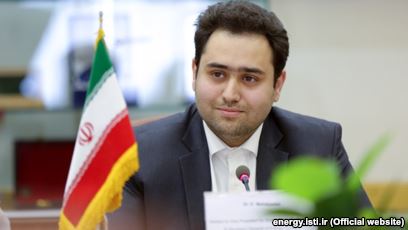
President Hassan Rouhani’s son-in-law has resigned three days after his appointment as the new Deputy Minister of Industry, Mine and Trade. Kambiz Mehdizadeh tendered his resignation following waves of criticism against nepotism in Iran’s social media.
Reza Rahmani, Minister of Industry, Mine and Trade, had lately said that Mehdizadeh was selected based on “meritocracy” and “had nothing to do with his being the President’s son-in-law.”
President Rouhani’s son-in-law was first appointed as the secretary of Energy Technology Development Council at the Iranian President’s office. He married Rouhani’s daughter last year and had no position in the government prior to his marriage.
Meanwhile, the son-in-law of Ahmad Khatami, Tehran’s Friday Prayer Imam, has been given a position at the directory board of Iran’s Plan and Budget Organization. His appointment, too, provoked severe criticism for the same reasons.
Khatami issued a statement today, saying he had not recommended his son-in-law neither for this position, nor any of his previous positions.
Khatami’s son-in-law, Hossein Mir Khalili, used to be Iran’s parliament member representing the city of Minab
Setare Sobh
Iranian Hackers after Accessing Emails of US Officials and Iranian Activists

According to AP news agency, a group of Iranian hackers called ‘Charming Kittens’ have tried to find access to personal emails of officials in US Treasury during the past month. High-profile defenders, detractors and enforcers of the nuclear deal struck between Washington and Tehran, Arab atomic scientists, experts in D.C. think tanks, and Iranian civil society activists were in the list of hackers.
The list includes tens of Yahoo and Gmail addresses that were gathered by London-based cyber-security group Certfa after gaining access to an unsafe server.
AP analysis of Charming Kitten’s targets suggests that it is working in close alignment with Islamic Republic’s interests. The most striking among them were the nuclear officials in Pakistan, Jordan, and Syria.
Previously, Wall Street Journal, in a detailed report, published a story on sanctioning two Iranian hackers who were digitally doing money laundering. US officials announced sanctioning two Iranians and prosecuting two other Iranians for the cyberattack called SamSam.
In this cyberattack, after hacking servers of hospitals, schools, ports and other institutions, they had asked for bitcoins, which were later laundered through online transactions.
VOA Persian – December 13
“Major Reduction” in Budget for Iran’s National Development Fund
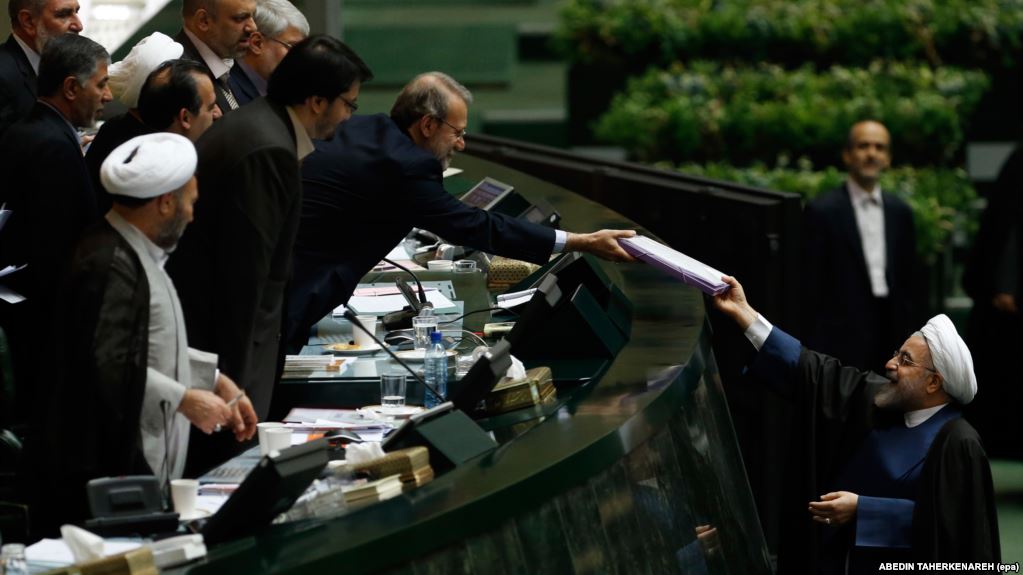
The budget dedicated to the National Development Fund of Iran has decreased from 34% to 10% in the country’s budget bill for next year, according to two lawmakers. The decision was made after Ali Khamenei ordered changes in the budget bill. A closed session in this regard was held at the parliament.
Iranian parliament has delayed presenting next year’s budget bill after Ali Khamenei found faults with it. Behrouz Nemati, spokesperson for the parliament’s presiding committee, said following the last meeting of heads of judiciary, legislative and executive branches with Khamenei, Hassan Rouhani’s government has decided to make some changes in the bill to improve it.
Previously, Fars News Agency reported due to “overwhelming decrease” in Iran’s oil export, there were disagreements about depositing 10 percent of oil revenue to the National Development Fund of Iran. Also, reports were published about Khamenei ordering to deduct money from Iran’s National Development Fund and spend it for military purposes.
National Development Fund was supposed to be used for confronting tough conditions and creating justice between generations, but last year Khamenei agreed with taking $4 billion from this fund for military purposes, IRIB and a number of civil projects. $2.5 billion was allocated to military purposes, used for providing costs of war in Syria.
Meanwhile, Mohammad Bagher Nobakht, head of Budget and Planning Organization, said the government’s revenue is going to cut to one third due to US sanctions.
Radio Farda—December 16
No Fuel for Iranian Aircrafts in European Airports
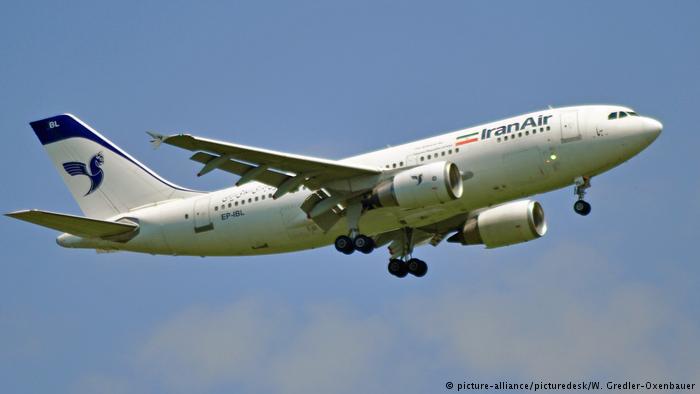
Deputy Minister of Roads and Urban Development said that most of European countries refuse to give fuel to Iranian aircrafts. According to Ali Abedzadeh, the United States intends to cut Iranian airlines’ foreign flights. He added that ‘Iranian airspace is open to all countries except Israel’. Abedzadeh urged that currently the US aircrafts pass through Iran’s airspace, adding that Iran hasn’t created any traffic limitations for any country and no country has imposed any limitations on Iranian flights in their routes.
As for not giving fuel to Iranian aircrafts in the airports of Turkey, Lebanon, and many other European countries, he stated that ‘unfortunately most of European countries avoid giving fuel to Iranian aircrafts, thus creating problems for us.’
Ali Rostami, managing director of Imam Khomeini Airport City, too, announced that so far, 7 foreign companies have stopped their flights to Imam Airport. He added that given the fluctuation in the rate of currency, there has been19% decrease in the number of flights coming and going to this airport.
Iran Air managing director Farzaneh Sharafbafi also said that the United States has put sanctions on all the aircrafts of Iran Air, even those that are grounded, destroyed, or were sold during past years. She urged, ‘I believe the measure of the United States aims at halting the development of Iran Air, trying to cut all domestic and foreign relations with this airline.’
Deutche Welle – December 17
